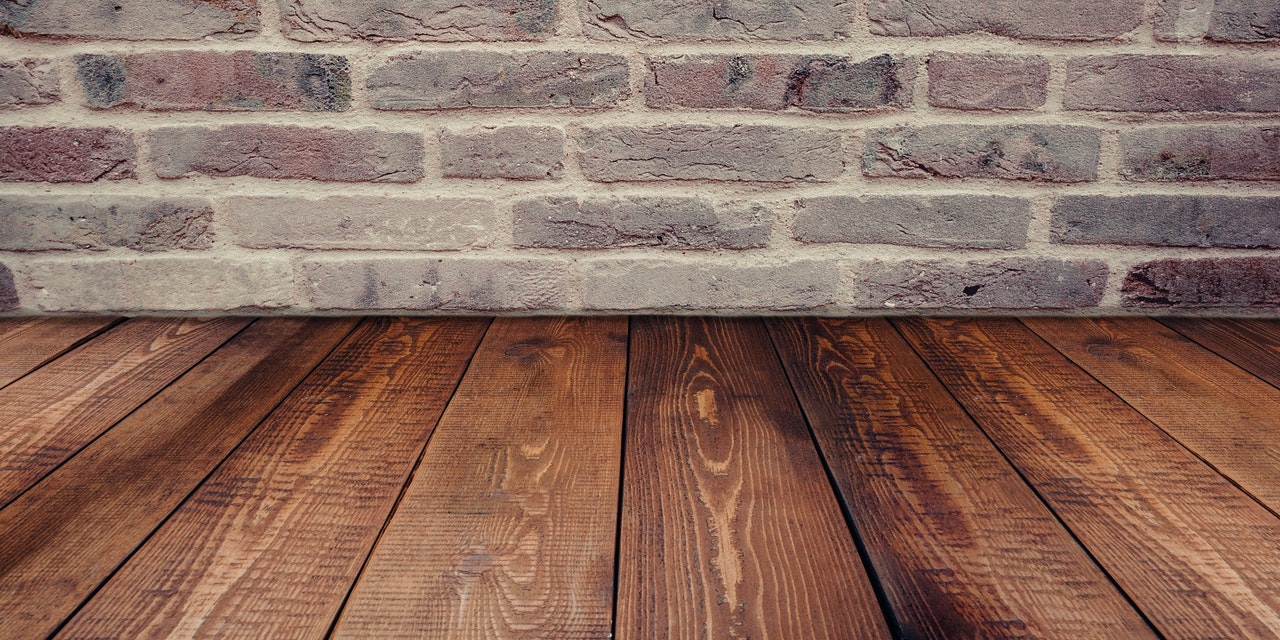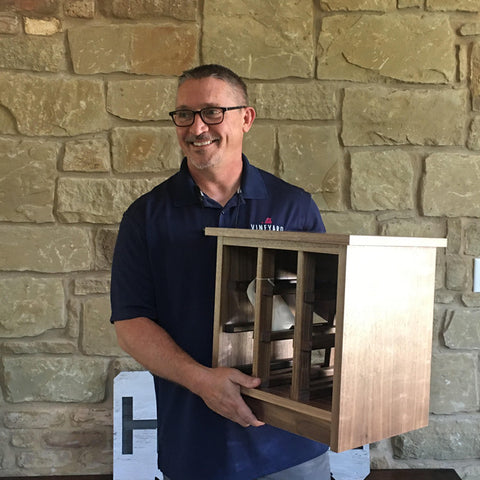Need help choosing wine cellar flooring?
In this post, we'll explore the wonderful world of wine cellar flooring. It may not be the first thing you think about when it comes to the design of your wine cellar, but your flooring choice is of utmost importance. In fact, your flooring choice may be an even bigger consideration than other design elements in your cellar, such as wine racks or lighting.
Why is that?
Unlike in other parts of your home, the flooring in your wine cellar isn't only about comfort or aesthetics. The flooring you choose can and should actually help to insulate your wine cellar.
The biggest reason for creating a cellar in your home is to control your wine's storage environment. If you've already checked out our guides to DIYing your in-home wine cellar or to choosing a cooling system for your cellar, you know the importance of insulating your walls, and choosing doors that provide an airtight seal when they close. However, all of your extra insulation efforts can go to waste if you choose the wrong floor.
Fortunately, you have a lot of options when it comes to wine cellar flooring. In this guide, we'll help you find a flooring choice that meets your style and budget while also protecting the sealed environment you’ve created in your wine cellar.
Top 5 Factors to Consider When Choosing Wine Cellar Flooring
Here’s what you need to know to narrow down your wine cellar flooring selections:
1. The Layers of Your Flooring
Depending on your wine cellar's location and the types of flooring that already exist in your home, you may have a wood or concrete subfloor. Generally, but not always, basements have a concrete subfloor. This type of flooring is ideal for a wine cellar because it is strong and durable.
However, that doesn't mean that you can use untreated concrete as your wine cellar flooring.
When working with a concrete slab, be sure to add a vapor barrier before adding your floor covering. A vapor barrier is a thin plastic sheet that protects your wine cellar from the other areas of your home. It keeps the humidity within the cellar and prevents the buildup of interstitial condensation on the outside of the cellar.
The last thing you want is to trap moisture under the floor of your cellar. This can lead to mold and a host of other problems. To protect your home from your wine cellar’s increased humidity, you must wrap the cellar’s floor, ceiling, and walls with plastic sheeting.
After adding a vapor barrier, you can then build a floor covering.
2. How Much Weight Your Flooring Needs to Hold
Your wine cellar floor has a big job to do. In addition to its insulating properties and style, you must also consider the weight capacity of the flooring. Your wine collection may hold 100 bottles or it may hold 1,000. Will the floor you choose be able to withstand that weight without cracking or buckling?
This is one of the biggest reasons why pine isn't a good choice for wine cellar flooring. Pine looks great and is affordable, easy to find, and easy to use, but it's soft and prone to warping. This is especially true in the more humid environment of a wine cellar. Consider that cherry can hold almost double the weight of pine (and it's also resistant to warping due to moisture).
The wine bottles themselves aren't the only weight to consider in your cellar. When calculating the cellar's weight load, you must include the weight of your racks, cooling equipment, humidifier, furniture, and accessories. The average bottle of wine weighs 3 lbs. If you have a small collection of 100 bottles, you're placing, at minimum, 300 lbs on your floor at all times. But if you have 1,000 bottles, you're adding 3,000 lbs to your floor – in addition to any furniture in your cellar.
Because the wine cellar can easily become one of the heaviest rooms per square foot in your home, you must choose flooring that can sustain weight. Otherwise, your floor can break and allow air to leak in or out, which can lead to destroyed wine due to an unstable cellar environment.
3. The Most Popular Flooring Options for Wine Cellars

Let’s look at the top flooring options available:
Wood
Wood, specifically hardwood, is a popular and beautiful choice for wine cellar flooring. It provides a natural earthiness to your cellar decor and matches with many styles. It's hypoallergenic and easy to clean. It's also durable.
Here are the best woods to consider in your wine cellar design:
- Ash
- Cherry
- Mahogany
- Maple
- Redwood
Cork
Cork is made from a tree but it is not wood. Cork is actually the outer bark of the cork oak tree. It's a natural substance that's been used for millennia in wine bottles, dating all the way back to ancient Greece. Since we know that wine stoppers are made of cork, we also know that cork is a good material for a wine cellar. It holds up in cooler and more humid environments. Because it is made up of air-filled cells, cork is porous and naturally cushion-y. There's a tiny bounce back when you walk on cork. Cork also looks beautiful and adds a playful touch to any cellar flooring.
Stone Tile
Stone is strong and also makes a strong impression. It looks natural but also gives off a more luxurious and stately impression than wood. Due to its versatility, stone is a great choice for almost all decor styles.
Ceramic and Porcelain Tile
Ceramic and porcelain are waterproof and low maintenance. These types of tiles are easy to install and easy to repair. They also look great and can come in a wide variety of styles and textures.
Mosaic Tile

For a more intricate expression, consider a mosaic flooring. Most mosaic tiles are created by inlaying smaller, roughly cut pieces of tile into a larger design. Mosaic tiles create an exciting pattern that's uniquely your own. Mosaic tiles are water-resistant, which is perfect in a room that contains so much liquid. These types of tiles can be made up of several materials, including glass, ceramic, porcelain, and stone.
Rubber
Rubber in a wine cellar? Absolutely.
Rubber is a great finishing option for flooring. It's water-resistant and durable. You can add rubber mats on top of your floor to protect the floor and your bottles, in the case of an accidental drop. Rubber flooring may not stop all breaks from happening, but you have better odds with rubber than you do with stone.
4. Materials You Should Never Use on Your Wine Cellar Floor
Now, let's look briefly at the flooring to avoid:
Certain Woods
Softwoods are not a proper choice for wine cellar flooring because this flooring may not be able to withstand the weight of the wine, furniture, equipment, and accessories in the space. Also softer woods can warp in humidity, and your cellar will be very humid.
Avoid pine for this reason.
Another wood to steer clear of is cedar. Cedar emits a lovely scent, but cedar is not appropriate in a cellar because wine absorbs scents.
Carpet
Carpets and wine cellars do not work well together.
Your wine cellar will be the most consistently humid space in your home. It requires a constant humidity level of between 50-70%. This means that carpets are a big no-no. The moisture accumulated in your wine cellar can cause mold to grow on your carpeting. Plus, carpeting is not as easy to clean as other surfaces on this list. And, in a wine cellar, there's bound to be a break or spill in the future. Carpeting is a hassle all around, and it's better suited for other, drier spaces in your home.
Radiant Heated Floors
Any form of heated flooring is a bad idea for a wine cellar. Wine cellars tend to be cold and humid, but that's by design. By introducing heated floors to your cellar, you'll increase the room's thermal load which will also increase the demand on your cooling unit. And what happens if your cooling unit fails and you don't find out about it right away? You could potentially "cook" your wine and destroy it. The bottom line? Keep your cellar floors cold and keep your feet warm by wearing slippers when entering.
5. Your Budget
The final factor to consider (but certainly not least) is your budget. How much do you have to spend on your wine cellar flooring?
The good news is that your wine cellar is probably a small space, so even if you choose a more expensive option, it won't break the bank. However, it's still a good idea to create a budget for your flooring when pricing out the design and build of your cellar. There will always be an unexpected cost with every home build or renovation. It's wise to go in with a plan of how much you're prepared to spend for each element of your design, and a contingency fund for unforeseen expenses that can occur during your build.
With proper planning, you won't have to downgrade your dream flooring, whichever one you choose.
The most affordable flooring options include ceramic tile, cork, and polished concrete.
On the other end of the spectrum in terms of affordability are luxury options such as Brazilian Cherry, Macassar Ebony, marble, and leather (yes, leather).
Final Thoughts
Your wine cellar flooring choice must meet several requirements: It should be stylish, functional, durable, and within your budget. The good news is that you have plenty of flooring options to choose from. Use the above tips to whittle down your preferred flooring.
If you need guidance, we're happy to help. Click here to contact the Wine Cellar HQ customer service team. You can email us, call us, or even chat with us online during office hours. We'd love to answer your wine cellar flooring questions.


